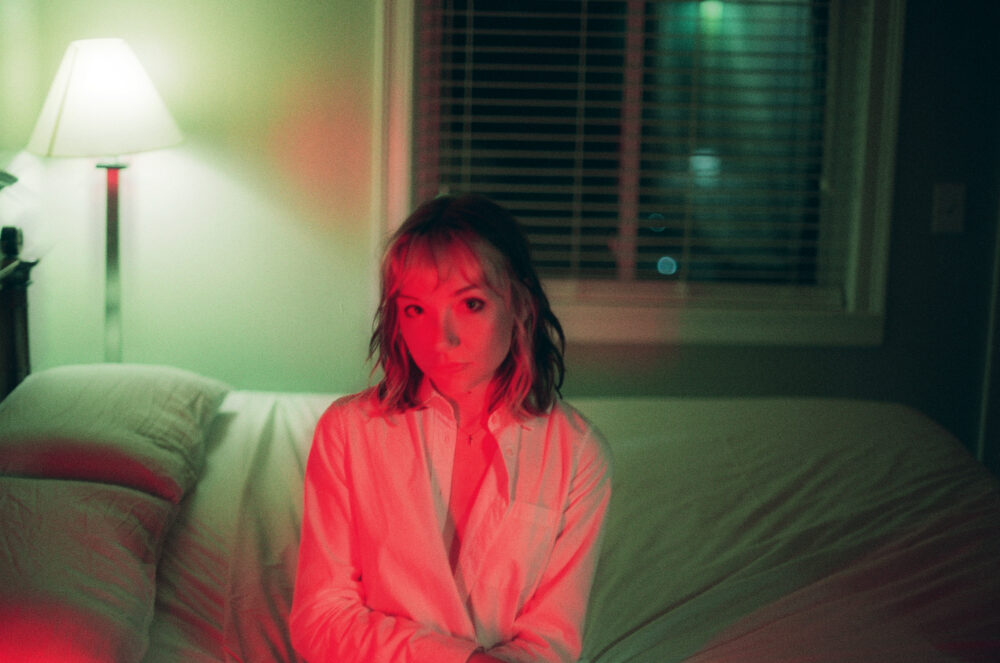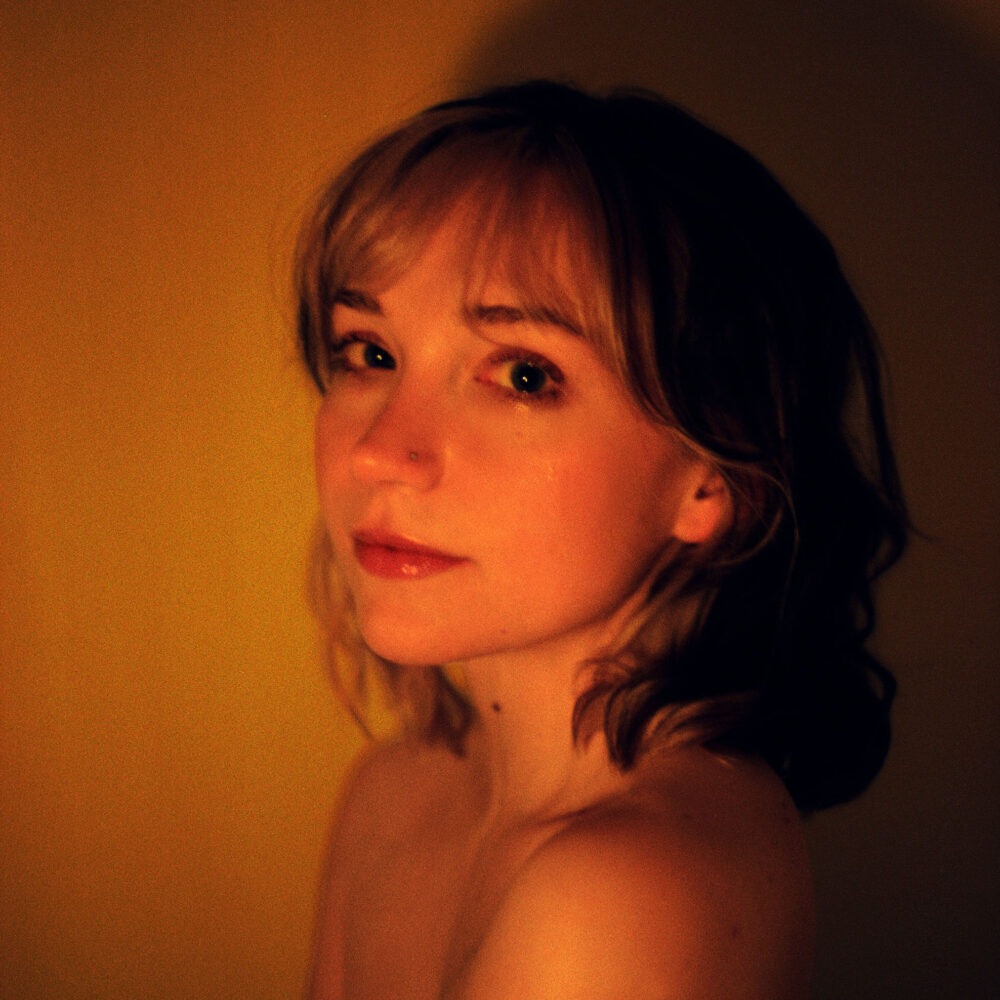Cocomyrrh: You’ve been releasing music for about a decade now, but how did it all start for you? When did Flower Face really begin?
Ruby McKinnon: It all started when I was around 13 or 14. I’ve always been a writer, and I’ve always loved music. I was into Tumblr back then and would listen to all these artists on Bandcamp. I thought, “I could do this.” My dad worked in radio, so we had some basic recording equipment at home. He taught me how to use it, and I recorded an album. It wasn’t good—I was so young—but I put it on Bandcamp anyway. I never expected anything to come from it. Over time, I gained this following from all over the world, and when I turned 17 or 18, I began releasing music on Spotify. That’s when I started taking it more seriously.

Cocomyrrh: What kind of things were you writing about back then?
McKinnon: Mostly things I had no real experience with. It was all fictional. I was writing about heartbreak, grief, loss—things I hadn’t gone through yet. It’s funny looking back, because those early songs feel prophetic now. I understand those feelings more deeply today, even though I didn’t really know what I was talking about at the time.
Cocomyrrh: Who were some of the artists you found on Tumblr that inspired you?
McKinnon: Nicole Dollanganger was a big one. We’ve actually become friends recently, which is surreal. I’d love to work with her someday. I was also really into Bright Eyes when I was around 11 or 12. I got into that whole world of confessional, lo-fi music.
Cocomyrrh: Your dad’s influence on your music seems important too. What kind of bands did he introduce you to?
McKinnon: Definitely. He introduced me to Bright Eyes, actually. He worked at a Detroit-Windsor alt-rock radio station and got early promo CDs. I remember him playing “Easy/Lucky/Free” for me when I was about eight. We’d listen to it in the car together. He also got me into The National, Tom Waits, and Portishead. I owe a lot of my music taste to both of my parents, actually.
Cocomyrrh: That’s a pretty intense soundtrack for an eight-year-old. You were basically doomed to write heartbreaking music from the start!
McKinnon: [Laughs] Totally. That’s where the downfall began. I think listening to all that music growing up shaped my ability to write songs about things I hadn’t experienced yet. Conor Oberst’s songwriting is so vivid that it made me think, “Yeah, I totally understand what it’s like to do drugs and be sad. I can write a song about that now.”
Cocomyrrh: You’ve talked about being a fangirl as a tween. How does it feel going from that to being a musician yourself?
McKinnon: It’s surreal to be on the other side of it. When I was younger, I’d go to shows, wait around to meet the band, and it would mean the world to me. Now, I get messages from people who feel that way about me. It’s a full-circle moment. I always try to stay connected to that feeling of gratitude I had for the artists I loved, so I can give something back to the people who connect with my music now.
Cocomyrrh: You signed to a label during the pandemic. Did that feel strange, especially since it was such an isolating time?
McKinnon: It was really weird. I signed the contract while I was living with my family, and it was all done over FaceTime. After the lockdowns lifted, I eventually met people from the label in LA, but it still didn’t feel entirely real. I also had to sit on The Shark In Your Water for a long time. We finished recording it right before the world shut down, so it didn’t come out until 2022. By then, the songs already felt old to me.
Cocomyrrh: Angela was a turning point for you, especially online. What do you think it was about that song that resonated with people?
McKinnon: Honestly, I don’t really know. It’s funny because I almost left it off the album! My mom loved it and convinced me to keep it. Looking back, I think maybe it resonated because it’s not just a sad song—it has some hope to it. People like to hold on to that little glimmer at the end, and I think Angela gives them that.
Cocomyrrh: Your sound between The Shark In Your Water and Girl Prometheus evolved so much. What drove that shift towards a more cinematic sound?
McKinnon: I’ve always been drawn to music that feels immersive and dramatic. My writing process starts out pretty stripped-back—just me and a guitar or piano—but I love building up layers in production. I wanted Girl Prometheus to feel bigger, more expansive. Recording with a string section was a huge part of achieving that.
Cocomyrrh: I noticed the cinematic soundbookends the album. Was that intentional?
McKinnon: Yeah, I wanted to set the tone with the first song, “Biblical Love,” by starting acoustic and then breaking into this huge, chaotic meltdown. Then, the last song ties everything together. I wrote it just a couple of weeks before going into the studio, and it felt like it had to be the ending. It was a way for me to step out of the emotional headspace of the album and move forward.
Cocomyrrh: “Biblical Love” has this intense moment where you scream the lyrics. What was it like recording that?
McKinnon: Oh, that was wild! We recorded the vocals in this isolated cottage, and one night I was there alone while my producer, Marcus, went back to the city. I had some whiskey and decided to try screaming the lyrics. I was convinced someone would call the cops, but it was so remote that no one heard. When Marcus got back, I nervously played it for him, and he loved it. That scream is now my favorite part of the song.
Cocomyrrh: That’s a great story! I also wanted to ask about the theme of love and heartbreak in your music. “Biblical Love” explores this idea of a love that never fully satisfies—like it’s doomed from the start.
McKinnon: I’ve always struggled with that feeling, that no matter how deep a connection is, it’s never quite enough. It’s like I’m searching for something more, but I don’t know if it’s out there or if it’s just me. There’s this inner turmoil about whether I want to conquer love or be conquered by it. That’s where the song kind of spirals into that emotional breakdown.
Cocomyrrh: In “Maniac,” you lean into the idea of being the “crazy girl” stereotype. Was that intentional?
McKinnon: Definitely. The song is like a conversation, but a little scathing. It’s about having someone tell you everything that’s wrong with you, and then you’re like, “Yeah, I know I’m difficult, but what about you?” It’s playing with that stereotype, but also reclaiming it.
Cocomyrrh: A lot of your work revolves around heartbreak. When did you realize that it was a topic you wanted to explore in your art?
McKinnon: I think heartbreak is the most universal feeling. Everyone goes through it, and yet when you’re in it, it feels so personal, like you’re the only one who’s ever experienced it. Writing about it, for me, was a way to survive the emotional intensity of it. It felt important, even if it seemed self-indulgent at times. I’ve come to embrace that.

Cocomyrrh: Breakup albums, especially from women, are sometimes dismissed as trivial or self-indulgent. How do you feel about that narrative?
McKinnon: It’s frustrating. Breakups are a huge part of life, and the feelings they bring are valid. Yes, writing about heartbreak can feel embarrassing, but it’s also universal. Everyone’s experienced it, and it’s important because it shapes us. After my big breakup, it felt like my world shattered, but the album isn’t really about that relationship anymore—it’s about how my life expanded and evolved afterward. Breakups force you to grow, and that’s worth exploring.
Cocomyrrh: Thanks so much for sharing, Ruby! This has been incredible. I can’t wait to see how Girl Prometheus connects with everyone.
McKinnon: Thank you! It’s been a pleasure to talk about it.
